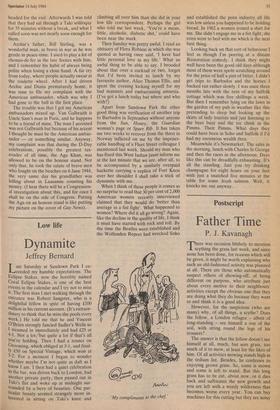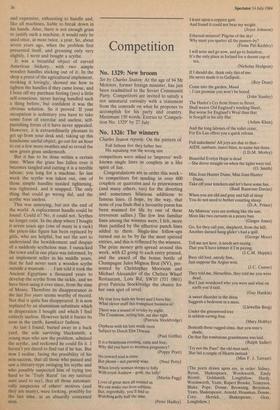Postscript
Father Time
P. J. Kavanagh
There was occasion blithely to mention scything the grass last week, and since none has been done, for reasons which will be given, it might be worth explaining why such an old-fashioned activity was planned at all. There are those who automatically suspect others of showing-off, of being different on purpose, who attribute just about every motive to their neighbours' activities except the obvious one that they are doing what they do because they want to and think it is a good idea.
However, for the suspicious (who are many) why, of all things, a scythe? Does the fellow, a London refugee – albeit of long-standing – see himself a son of the soil, with string round the legs of his trousers?
The answer is that the fellow doesn't see himself at all, much, but sees grass, too much of it to mow, at least for the likes of him. Of all activities mowing stands high in the tedium list. Besides, he confesses to enjoying grown grass. So, some is mown and some is left to stand. But this long grass has to be cut, about now, or it dies back and suffocates the new growth and you are left with a weedy wilderness that becomes worse every year. You can buy machines for this cutting but they are noisy and expensive, exhausting to handle and, like all machines, liable to break down in his hands. Also, there is not enough grass to justify such a machine, it would only be used once, at most twice, a year. So, about seven years ago, when the problem first presented itself, and groaning only very slightly, I went and bought a scythe.
It was a beautiful object of curved American hickory, with two simple wooden handles sticking out of it. In the shop a priest of the agricultural implement, stroking it lovingly, showed me how to tighten the handles if they came loose, and I bore off my purchase feeling (yes) a little self-conscious, never having handled such a thing before, but confident it was the obvious solution. So it proved. If your occupation is sedentary you have to take some form of exercise and useless, self- punishing forms of it have never appealed. However, it is extraordinarily pleasant to get up from your desk and, taking up this handsome useful object, go out for an hour to cut a few more swathes and so reveal the new green grass underneath.
But it has to be done within a certain time. When the grass has fallen over it becomes tangled and cutting it is a terrible labour; you long for a machine. So last week the scythe was taken out, one of those simple handles needed tightening, was tightened, and it snapped. The only thing that could go wrong did, and the scythe was useless.
This was annoying, but not the end of the world. A replacement handle could be found. Could it? No, it could not. Scythes no longer exist. In the shop where I bought it seven years ago (one of many in a rack) the priest-like figure has been replaced by girls, who are helpful, but not the sort to understand the bewilderment and despair of a suddenly scytheless man. I ransacked the town and in one place was informed, by an implement seller in his middle years, that he had never seen a wooden scythe outside a museum . . . I am told it took the Ancient Egyptians a thousand years to develop the scythe from the sickle, and we have been using it ever since, from the time of Moses. Therefore its disappearance in the last five years seems worthy of record. Not that it quite has disappeared. It is now replaced by an aluminium substitute which in desperation I bought and which I find entirely useless. However held it buries its nose in the earth, kamikaze fashion.
At last I found, buried away in a back yard, the sole surviving blacksmith; a young man who saw the problem, admired the scythe, and reckoned he could fix it. I haven't yet dared to find out if he has. But now I realise, facing the possibility of his non-success, that all those who passed and saw a literary-type swinging his scythe and who possibly suspected him of trying too hard to be 'Truly Rural' (as my satirical aunt used to say), that all those automati- cally suspicious of others' motives (and they are many), were looking, possibly for the last time, at an absurdly contented man.















































 Previous page
Previous page